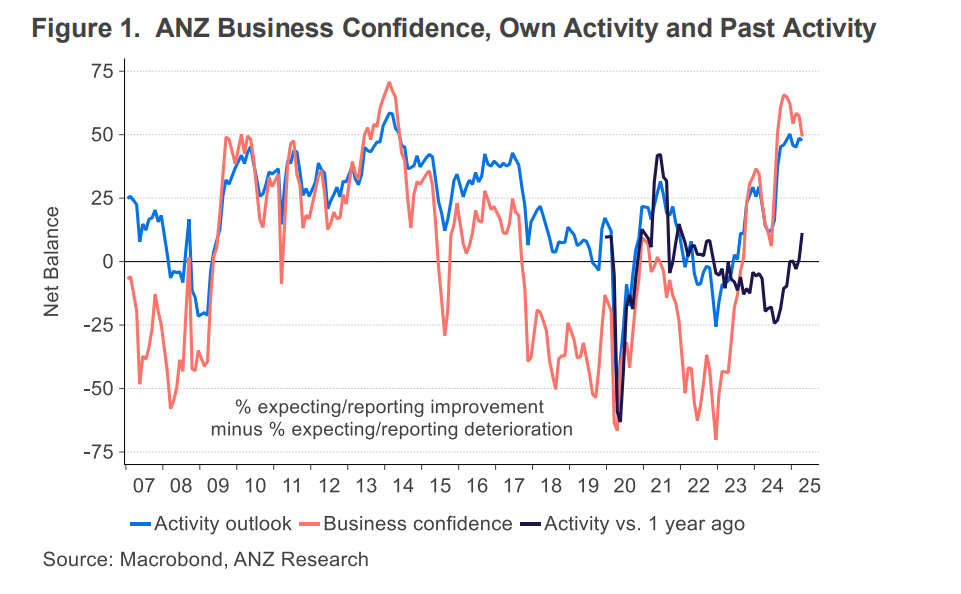Confidence dips, but underlying activity holds firm

New Zealand business confidence slipped in April, with headline sentiment falling nine points to +49, according to the latest ANZ Business Outlook survey.
While expected own activity declined slightly by one point to +48, firms’ reports on actual activity improved sharply.
“Business confidence fell nine points to +49 in April, while expected own activity fell just one point to 48. More positively, past own activity... jumped 10 points from 1 to 11, while past employment jumped eight points, from -6 to 2,” said Sharon Zollner (pictured left), ANZ chief economist.
ANZ noted that past activity—a reliable indicator of GDP—showed stronger performance in April. For the first time since June 2023, a greater proportion of firms (26%) reported having more staff than a year ago, compared to 24% with fewer.

Late-month turbulence drags on outlook
ANZ said the survey revealed a split in sentiment depending on when responses were submitted. Early-month responses (April 1–4) remained upbeat, while those submitted later (April 22–24) reflected increased pessimism following the announcement of US trade tariffs.
“Most forward-looking activity indicators were sharply lower in the late-month responses,” Zollner said. “The data does support the idea that the turmoil has had a marked negative impact on most forward-looking indicators, and particularly on headline business confidence and businesses’ plans to invest.”
Still, ANZ cautioned that the late-April sample was small and more volatile, calling it “a directional signal rather than taking the numbers as gospel.”
Margin squeeze intensifies as cost pressures persist
The April survey also highlighted ongoing margin pressure. Firms expect costs to rise by an average of 2.7% over the next three months, but plan to raise prices by just 1.8%.
“That indicates margin squeeze – a long-running theme – amidst persistent cost pressures,” Zollner said.
One-year inflation expectations remained stable at 2.65%, suggesting businesses do not foresee runaway price growth, despite rising cost concerns.
Trade-exposed sectors show greater volatility
There was a notable divergence by industry. While confidence improved among domestic services businesses, sentiment weakened in trade-exposed sectors such as manufacturing and agriculture.
“The ANZ April business opinion survey – the first one held since the US ‘Liberation Day’ tariff announcement – was remarkably steady,” said Westpac NZ senior economist Michael Gordon (pictured right).
“Sentiment about general conditions was softer compared to March, but firms’ own-activity expectations were little changed and remain at high levels.”
A net 11% of businesses said general conditions were better than a year ago—a significant jump from March, suggesting some degree of resilience in the face of external uncertainty.
Inflation expectations steady, but caution remains
Despite cost pressures, pricing expectations have remained restrained. A net 78% of firms expect their own costs to rise, up from 74% in March, yet pricing intentions have softened slightly.
“Firms’ own pricing intentions eased back slightly, and expectations of the inflation rate over the year ahead were little changed,” Gordon said.
Overall, both ANZ and Westpac economists suggested that businesses are taking a measured approach to the US tariff fallout—for now.
“The direct impact of the 10% on NZ exports is unwelcome but is likely to be manageable,” Gordon said. “The indirect impacts will be more significant but are harder to assess and will depend in part on how policymakers in other countries respond.”
Read the ANZ report and insights from Westpac.



